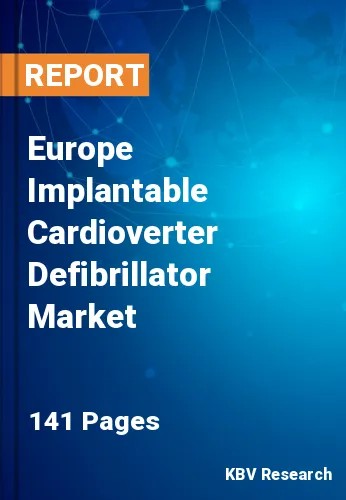
The Europe Implantable Cardioverter Defibrillator Market would witness market growth of 5.7% CAGR during the forecast period (2023-2030).
The implantable cardioverter defibrillator (ICD) is an electronic medical device that monitors and controls cardiac rhythms in patients at risk for life-threatening arrhythmias, such as ventricular tachycardia and ventricular fibrillation. Technological advancements, an escalating incidence of sudden cardiac arrest, a growing public awareness, and supportive government and healthcare policies contribute to the market's expansion. With the increasing prevalence of cardiovascular diseases, it is anticipated that the demand for advanced cardiac care solutions, such as ICDs, will increase, creating opportunities for expansion and innovation in the healthcare industry.
The rising frequency of cardiac diseases and related risk factors, which make sudden cardiac arrest (SCA) deaths a substantial cause of mortality, are predicted to increase the demand for cardiac resynchronization therapy devices (CRT-Ds). A further factor in the need for CRT-Ds is heart failure, a leading cause of death. The increasing incidence of SCA has increased the demand for defibrillators, as survival rates remain low, particularly for out-of-hospital cases. ICDs are essential for patients with abnormal heart rhythms, with a greater prevalence among older individuals with coronary artery disease (CAD).
As per the European Cardiovascular Disease Statistics 2017, cardiovascular disease (CVD) causes over 1.8 million fatalities in the European Union and over 3.9 million deaths in Europe each year. In Europe and the EU, CVD is the primary cause of mortality in 45% and 37% of cases, respectively. CVDs are the leading cause of death in Europe. These diseases encompass various conditions, including coronary artery disease, heart failure, arrhythmias, and others. The prevalence of CVDs varies across European countries but is generally high. Several risk factors contribute to most European CVDs, including smoking, unhealthy dietary habits, physical inactivity, obesity, and excessive alcohol consumption. These risk factors are often modifiable through lifestyle changes and interventions.
The Germany market dominated the Europe Implantable Cardioverter Defibrillator Market, By Country in 2022, and would continue to be a dominant market till 2030; thereby, achieving a market value of $371 million by 2030. The UK market is experiencing a CAGR of 4.8% during (2023 - 2030). Additionally, The France market would exhibit a CAGR of 6.5% during (2023 - 2030).
Based on Type, the market is segmented into Biventricular Devices, Dual Chamber ICDs and Single Chamber ICDs. Based on Product Type, the market is segmented into Transvenous and Subcutaneous. Based on NYHA Class, the market is segmented into NYHA Class II and NYHA Class III. Based on End-Use, the market is segmented into Hospitals, Ambulatory Surgical Centers and Others. Based on countries, the market is segmented into Germany, UK, France, Russia, Spain, Italy, and Rest of Europe.
Free Valuable Insights: The Global Implantable Cardioverter Defibrillator Market will Hit $5.6 Billion by 2030, at a CAGR of 6.1%
The market research report covers the analysis of key stake holders of the market. Key companies profiled in the report include Abbott Laboratories, Medtronic PLC, Biotronik SE & Co. KG, Boston Scientific Corporation, MicroPort Scientific Corporation, Stryker Corporation, ZOLL Medical Corporation (Asahi Kasei Corporation), LivaNova PLC, Koninklijke Philips N.V. and Getinge AB.
By Type
By Product Type
By NYHA Class
By End-use
By Country
Our team of dedicated experts can provide you with attractive expansion opportunities for your business.
